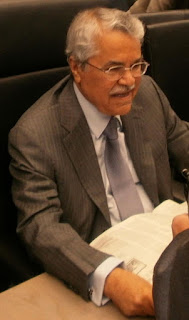.jpg) The Brent forward month futures contract for August spiked above US$106 per barrel in intraday trading on Friday at one point. Most analysts cited an escalation of the Syrian situation and the possibility of it morphing into a wider regional conflict as a reason for the 1%-plus spike. The trigger was Obama administration’s reluctant acknowledgement the previous evening of usage of chemical weapons in Syria. The Oilholic’s feedback suggests that more Europe-based supply-side market analysts regard a proactive US involvement in the Syrian muddle as a geopolitical game-changer than their American counterparts. There is already talk of Syria become as US-Russia proxy war.
The Brent forward month futures contract for August spiked above US$106 per barrel in intraday trading on Friday at one point. Most analysts cited an escalation of the Syrian situation and the possibility of it morphing into a wider regional conflict as a reason for the 1%-plus spike. The trigger was Obama administration’s reluctant acknowledgement the previous evening of usage of chemical weapons in Syria. The Oilholic’s feedback suggests that more Europe-based supply-side market analysts regard a proactive US involvement in the Syrian muddle as a geopolitical game-changer than their American counterparts. There is already talk of Syria become as US-Russia proxy war.Add to that Israel’s nervousness about securing its border, jumpiness in Jordon and behind the scenes manipulation of the Assad regime and Syria by Iran. In an investment note, analysts at Barclays have forecasted Brent to climb back to the Nelson figure of 111. Yet a deeper examination of what the bank’s analysts are saying would tell you that their take is not a reactive response to Syria.
In fact, Barclays cites supply constriction between OPEC members as a causative agent, specifically mentioning on-going problems in Nigeria, Libya and shipment concerns in Iraq. For what its worth, and appalling as it might well be, Syria's conflict is only being priced in by traders in passing in anticipation of a wider regional geopolitical explosion, which or may not happen.
Away from OPEC and Syria, the Sudan-South Sudan dispute reared its ugly head again this week. A BBC World Service report on Thursday said Sudan had alleged that rebels based in South Sudan attacked an oil pipeline and Diffra oilfield in the disputed Abyei region. The charge was denied by South Sudan and the rebels.
The news follows Sudan’s call for a blockade of South Sudan's oil from going through the former’s pipelines to export terminals to take effect within 60 days. The flow of oil only resumed in April. Both Sudan and the South are reliant on oil revenue, which accounted for 98% of South Sudan's budget. However, the two countries cannot agree how to divide the oil wealth of the former united state. Some 75% of the oil lies in the South, but all the pipelines…well run north.
As the geopolitical analysts get plenty of food for thought, BP’s latest Statistical Review of World Energy noted that global energy consumption grew by 1.8% in 2012, with China and India accounting for almost 90% of that growth. Saudi Arabia remained the world’s top producer with its output at 11.5 million barrels of oil equivalent per day (boepd) followed by Russia at 10.6 million boepd. However, the US in third at 8.9 million boepd gave the “All hail shale” brigade plenty of thought. Especially, as BP noted that 2012 saw the largest single-year increase in US oil production ever in the history of the survey.
Moving on to corporate news, Fitch Ratings said Repsol's voluntary offer to re-purchase €3 billion of preference shares will increase the group's leverage, partially offsetting any benefit from the proceeds of its recent LNG assets divestment (revealed in March). This reduces the potential for an upgrade or Positive Outlook on the group's 'BBB-' rating in the near term, the agency added. Repsol's board voted in May to repurchase the preference shares partly with cash and partly with new debt.
Finally, Tullow Oil has won its legal battle, dating back to 2010, over tax payable on the sale of oilfields in Uganda. On Friday, the company said a UK court had ruled in favour of its indemnity claim for $313 million in its entirety (when the Uganda’s government demanded over $400 million in capital gains tax after Heritage Oil sold assets in the country to Tullow in a $1.45 billion deal).
Heritage said it would now evaluate its legal options and could launch an appeal. When the original deal between Heritage and Tullow was concluded, Tullow paid the Ugandan Revenue Authority $121.5 million – a third of the original $405 million tax demand – and put the remaining $283.5 million into an escrow account.
That’s all for the moment folks! The Oilholic has arrived in Belfast ahead of 2013 G8 Summit in Northern Ireland under the UK’s presidency, where Syria, despite the meeting being an economic forum, is bound to creep up on the World leaders’ agenda. As will energy-related matters. So keep reading, keep it ‘crude’!
To follow The Oilholic on Twitter click here.
To email: gaurav.sharma@oilholicssynonymous.com
© Gaurav Sharma 2013. Photo: Veneco Oil Platform, California, USA © Rich Reid / National Geographic.




